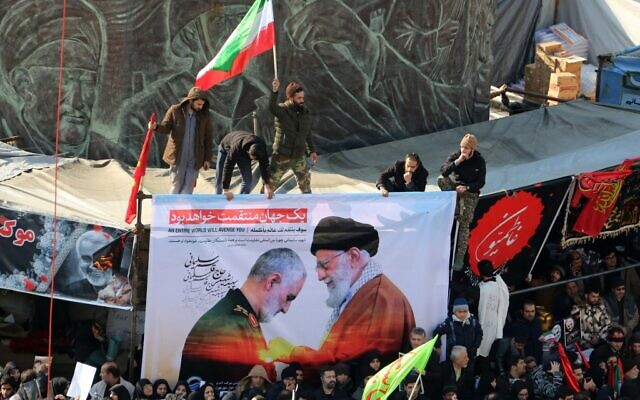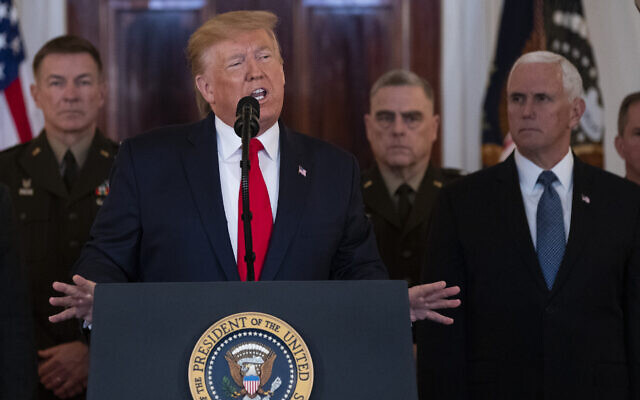Brief statement from White House says says two leaders spoke of ‘bilateral and regional issues,’ without giving further details, PM earlier warned Tehran against hitting Israel

US President Donald Trump spoke Wednesday with Prime Minister Benjamin Netanyahu following an Iranian missile strike on US forces in Iraq, the White House said.
A brief statement said the two leaders discussed “critical bilateral and regional issues,” giving no further details. There was no confirmation or comment from Israel.
Earlier Wednesday, Netanyahu warned Iran against attacking Israel in response to the American killing last week of senior military commander Qassem Soleimani and congratulated Trump for ordering the strike.
“We’re standing steadfast against those who seek our lives. We’re standing with determination and with force. Whoever tries to attack us will receive a crushing blow in return,” he declared at a conference in Jerusalem.
Netanyahu was speaking after Iran fired over a dozen missiles at US bases in Iraq. Iran claimed 80 US troops were killed in the strikes, and warned that it could strike next at Israel; the US said there were no casualties.
In recent days a senior commander in Iran’s Islamic Revolutionary Guard Corps has warned that Tel Aviv could also be targeted, while a former head of the IRGC threatened to turn Israeli cities “to dust” if the US attacks targets in Iran.
“Qassem Soleimani was responsible for the death of countless innocent people,” Netanyahu said. “He destabilized many countries. For decades, he sowed fear and misery and anguish. And he was planning much worse.

“President Trump should be congratulated for acting swiftly, boldly and resolutely against this terrorist-in-chief, who was the architect and driver of Iran’s campaign of terror throughout the Middle East and throughout the world,” he added.
“In the Middle East, no day is like any other. The regional upheaval continues. The struggle between extremists and moderates continues unabated,” the prime minister went on.
“On one side is radical Islam led by Iran, which seeks to grasp large sections of the area by means of murderous terrorism, and to grasp, strangle and eliminate us, because they understand that the strongest force of Western culture is here, in the State of Israel. They understand this very well.”
Many leaders in the Middle East agree with him, the prime minister said. The region is split between radical Islamists and a “pragmatic camp” that is threatened by the extremists.
“This camp well understands the campaign for existence, for life and for the future,” Netanyahu said. “The State of Israel is the anchor of stability in these stormy waters. The challenges that we are dealing with are not lessening — on the contrary.”
Netanyahu also reiterated Israel’s full support for the United States in its ongoing military confrontation with the Islamic Republic.
“It’s very important to say that Israel stands completely beside the United States,” he added. “America has no better friend than Israel, and Israel has no better friend than America.”
Later Wednesday, Trump signaled he would not retaliate militarily Iran’s missile strikes.
Speaking from the White House, Trump seemed intent on deescalating the crisis: “Iran appears to be standing down, which is a good thing for all parties concerned and a very good thing for the world,” he said.

Despite such conciliatory talk, the region remained on edge, and American troops including a quick-reaction force dispatched over the weekend, were on high alert. Last week Iranian-backed militia besieged the US Embassy in Baghdad, and Tehran’s proxies in the region remain able to carry out attacks such as the one on Dec. 27 that killed a US contractor and set off the most recent round of hostilities.
Israeli officials, however, believe Iran is unlikely to attack Israel in retaliation for the US airstrike that killed Soleimani in Iraq.
According to several officials who were present at the cabinet meeting Monday and spoke to Hebrew media, several scenarios were presented regarding Iran’s possible response to the attack, with the security officials saying the chances of an attack on Israel were low.
“Israel was not involved in the killing and there’s no reason it will be dragged into it,” one senior official said.
As reported by The Times of Israel
